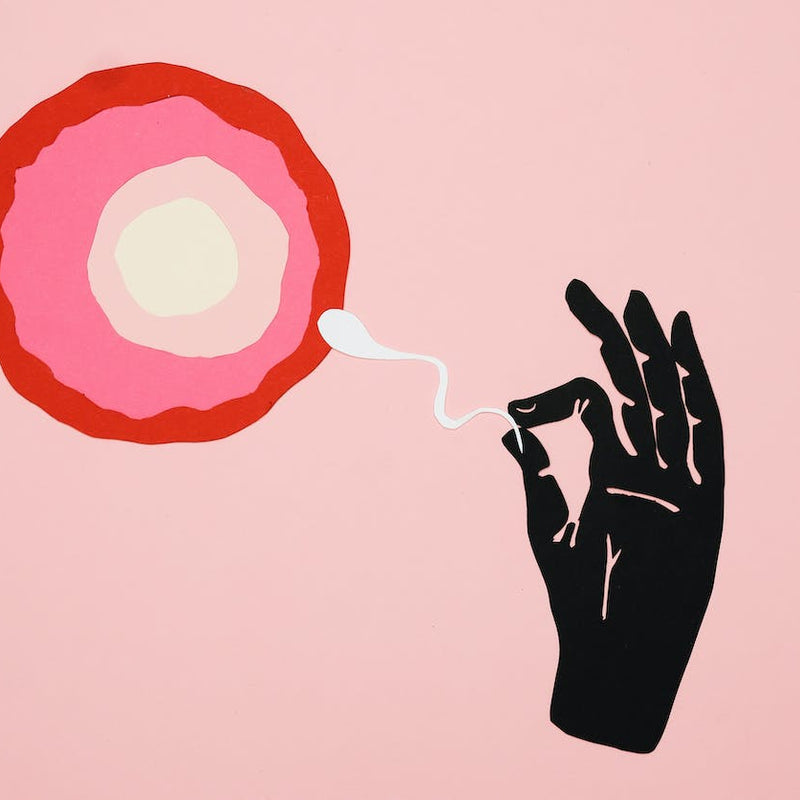Can I Use Lube While Pregnant?

So which lubes are safe for mom and baby, but effective in getting the job done? OBGYN Dr. Gleaton explains that while lubricants are absolutely safe in pregnancy, not all are created equal.
Most newly pregnant women are thrilled to trade “timed intercourse” for a little bedroom spontaneity. After all, libido is enhanced, and nerve endings are often easily excited. And although many women experience increased vaginal secretions thanks to estrogen, some also note irritability and discomfort during intercourse. So which lubes are safe for mom and baby, but effective in getting the job done? We’re so glad you asked…
What Is Lube Used For?
Lube, short for lubricant, is used during sexual intimacy to reduce friction or irritation. The vagina is naturally moist but increases secretions from the cervix and bartholin’s glands when aroused. Various situations, such as hormonal shifts (think pregnancy or menopause), dehydration, and medications (including antihistamines), can lead to inadequate vaginal secretions. This may result in painful intercourse, vaginal itching, irritation, and even tissue trauma and bleeding.
Lubricants are a healthy and safe way to increase sexual pleasure and reduce unwanted trauma during and after intercourse. Here’s a guide to the different types of lube →
Can You Use Lube When Pregnant?
Lubricants are absolutely safe in pregnancy and can ease painful intercourse, but not all are created equal. [1] Pregnancy increases blood flow to the vagina and can lead to increased vaginal sensitivity. When choosing a lubricant, look for one that is water-based and free of parabens and glycerin. These chemicals can not only increase irritation, but in some studies have been shown to increase the risk for vaginal infections, including yeast. [2]
The best lubricants for use during pregnancy are those that are iso-osmotic, which means they match the healthy conditions of the vagina—they don't add or subtract anything, nor disrupt the vaginal pH. At Natalist, we created The Lube to be just that, with a clean, frictionless consistency that preserves fun and intimacy, without unwanted side effects. As with all medical devices and supplements, we recommend you talk to your doctor before use to ensure this is the right product for you. Learn more about Lube and Vaginal Health
Lube Ingredients to Avoid and Look For When Trying to Conceive
When trying to conceive, the stakes are even higher, so pay close attention the ingredients in your lubricant. Consider three main factors when it comes to lubricant:
- FDA cleared as “fertility friendly:” This is a special designation given to an extensively-tested lubricant whose formula is vaginally balanced and won't harm sperm, eggs, or embryos.
- Water-based: In contrast to oil or silicone based. This is especially true when undergoing hormonal treatments for infertility which can lead to increased vaginal dryness and discomfort.
- Paraben-free: Parabens are essentially preservatives, and a Harvard University study has raised concerns regarding their potential link to infertility. [3]
Lubricant For Fertility
Time to conception is determined by various factors including age, medical, and pregnancy history as well as lifestyle factors. In addition, more randomized controlled trials are needed to truly assess lubricants and pregnancy rates. With that in mind, there are lubricants with pH-altering properties that may negatively affect sperm, thus ultimately interfering with baby-making efforts. (Find out what the pH of fertility-friendly lubricant should be) And while various market formulations exist such as sperm-friendly and non spermicidal, fertility-friendly lubricant is the only FDA-cleared option when TTC.
Natalist Offers FDA-Cleared Lubricant
As you can see, there are many factors to consider when it comes to lubes during pregnancy. One factor which is often overlooked—but not under appreciated during pregnancy—is ease of use! As pregnancy progresses, lube application can become increasingly difficult, as can tying shoes, shaving, and painting toes! I’d recommend considering a user-friendly lube that is applicator-free to reduce this common hassle. Natalist offers an easy-to-use, water-based, fertility-friendly lubricant that may also be safe for use during pregnancy! We always suggest speaking to your healthcare provider before the use of any new products when pregnant or breastfeeding.
References:
- When Sex Is Painful FAQ020. ACOG. January 2022. URL.
- Vulvovaginal Health. FAQ 190. ACOG. January 2022. URL.
- Smith KW, Souter I, Dimitriadis I, et al. Urinary paraben concentrations and ovarian aging among women from a fertility center. Environ Health Perspect. 2013;121(11-12):1299-1305. doi:10.1289/ehp.1205350
Reach Out, We're Here
Have questions about your order or products? For the speediest answer, check out our FAQ section. Need something else? Come find us below.
Please keep in mind our regular business hours; Monday-Friday, 9am-5pm CT.
Customer Support
support@natalist.com
Press Inquiries
media@everlyhealth.com
Business & Partnerships
team@natalist.com
Affiliates + Influencers
team@natalist.com
Job Openings
Careers Page
























